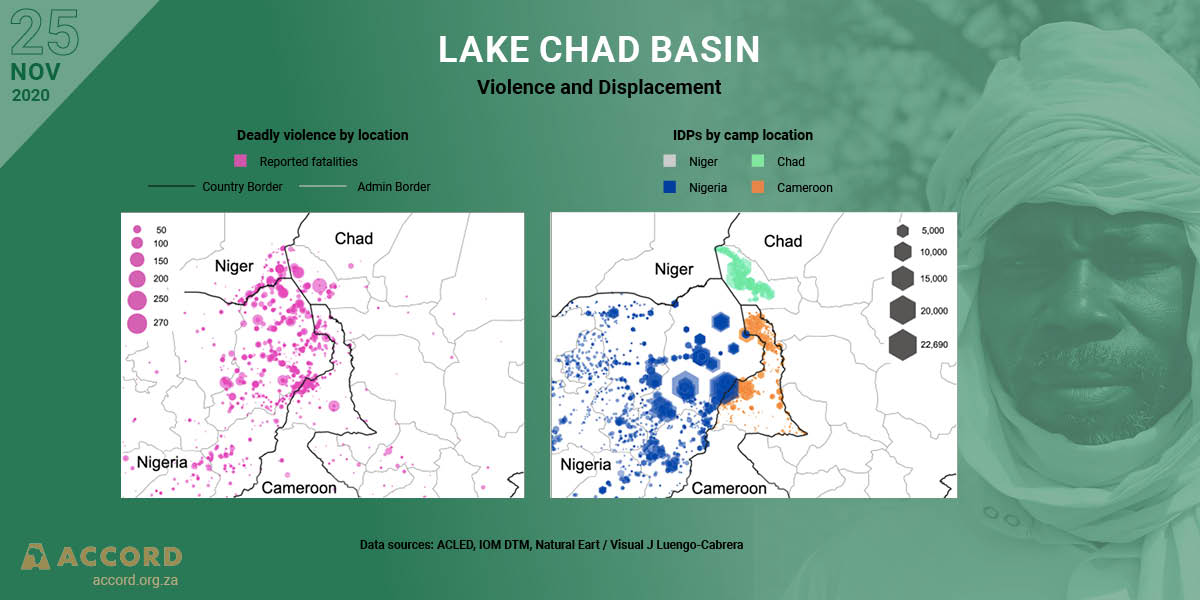According to the Office for the Coordination of Humanitarian Affairs (OCHA) humanitarian snapshot of 16 September 2020, the once economically viable and thriving region is now faced with monumental challenges, where about 2.6 million internally displaced persons (IDPs) and 256 000 refugees across the region are under physical and emotional strain. They lack shelter, food and adequate access to clean water, hygiene and basic sanitation. Furthermore, about 5.2 million people are severely food insecure, while 500 000 children are at risk of acute malnutrition.
The outbreak of the COVID-19 pandemic in the Lake Chad Region exacerbated the myriad of challenges and threats in the area, making an already dire situation worse @Amb_MNuhu
Tweet
The outbreak of the COVID-19 pandemic in the region has exacerbated the myriad of challenges and threats in the area, worsening the already dire situation. The pandemic has also significantly heightened the economic needs in the region, impacted on the livelihoods and productivity of the region, disrupted markets and employment opportunities and created general declines in revenue. To check the spread of the virus, the governments of the region have adopted measures that include curfews, travel restrictions and border closures, closures of offices and other economic spaces, and restrictions on religious and social gatherings, among others. These measures have had serious socio-economic impacts on the people of the region, as they have limited their access to social capital and hindered their ability to tap into existing structures and channels of social support in the region. Churches, mosques and other places of social gatherings, which hitherto provided sources of livelihood, have been severely affected due to the restrictions.
The mainstay of economic activities of the people of the region include farming, fishing, cattle breeding and trading, as well as cross-border economic ventures. These activities require daily engagements and cross-border movements to thrive and generate income. However, with the closure of borders and restrictions on social and economic gatherings, which would otherwise have created opportunities for trade, families face further economic challenges. These restrictions have also rendered many of the youths in the region jobless and idle, as many of them depend on daily paid wages. Such conditions have heightened their frustration and made them vulnerable to enticement by terrorists and other criminal organisations.
Although various governments in the region have introduced palliative measures to cushion the effect of COVID-19, particularly on the poor and vulnerable, the palliatives are grossly inadequate. The situation is even more challenging because the greater percentage of the population derive their livelihood from informal economic activities sustained by social interaction and access to existing social and economic capitals that transcend national boundaries. Accordingly, an interplay of the pandemic and the containment measures put in place by governments has resulted in a lack of access to service delivery for communities and populations in the region. Governments have rechannelled the already scarcely available human, financial and material resources towards the containment of COVID-19, to the disadvantage of other community healthcare needs. The rechannelling of available healthcare resources to contain COVID-19 has created an additional burden for families to access healthcare in an area with a dearth of health systems and infrastructure.
In terms of family structures and issues around gender, the containment measures have also led to scarcity and increased prices of essential goods and critical health services for women and girls. The outbreak of COVID-19 further exposed the existing healthcare system and delivery gaps in the region, and points to the need for investments in healthcare infrastructure by both governments and the private sector.
In terms of the human development index, the Lake Chad Basin region is one of the least developed regions in the world, across all the indicators. The outbreak of insurgencies and extremism in the region over the last decade has also compounded education woes for the region. It is estimated that over 1 000 schools have been closed, with over 140 million children out of school across the West and Central Africa regions, due to violent extremism. In border communities and communities on the fringes of the violence, children and youth are mostly deprived of educational and vocational training opportunities. Humanitarian actors, such as the United Nations Children’s Fund (UNICEF) and the United Nations Refugee Agency (UNHCR), have provided educational support to governments by establishing distance learning programmes and have distributed school work packages to the most vulnerable pupils. However, the outbreak of COVID-19 has stalled this educational support to the vulnerable in the region, due to a lack of access to facilities.
The outbreak of the COVID-19 pandemic has no doubt exacerbated the already existing fragility in the Lake Chad Basin. While most countries in the region are on a path of recovery, the impact is still visible in the daily lives of the population. Some businesses have been forced to shut down, while others still operate below optimum level. General commercial and educational activities are yet to fully resume. Without doubt, the economic impact of the pandemic no doubt calls for strategic actions and interventions in a manner that will make even extremely scarce resources available for the right interventions across the region, to boost resilience and strengthen security.
Accordingly,the Lake Chad Basin Commission’s Regional Strategy for Stabilisation, Recovery and Resilience of the Boko Haram-affected areas provides an overarching and comprehensive framework for the region to address its multifaceted development, humanitarian and peace challenges. The strategy provides a framework for addressing many drivers of fragility at play in the region, as well as other COVID-19-induced challenges. It also provides opportunities for regional and international bodies to support the region through a coordinated structure under a comprehensive framework that supports humanitarian, development and peace nexus approaches for interventions at local, national and regional levels.
Ambassador Mamman Nuhu is the executive secretary of the Lake Chad Basin Commission and the head of mission of the Multinational Joint Task Force (MNJTF).

